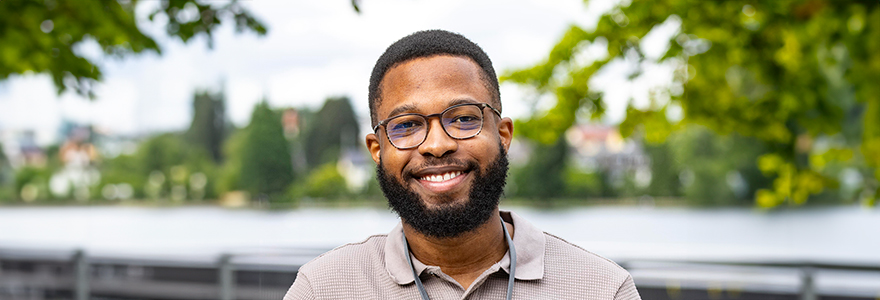Medical Biophysics PhD student joins Nobel Laureates to discuss AI in science

By Cynthia Fazio
When it comes to building trust with AI models, Jaryd Christie, a Schulich Medicine & Dentistry PhD student in the department of Medical Biophysics, wants to make sure people have an in-depth understanding of the models they’re using.
Christie is sharing his insights at the 73rd Lindau Nobel Laureate Meeting, as part of a panel on ‘How to Preserve Trust in Science in the Age of AI?’ He is the only student panelist and will be joined by laureates Donna Strickland, Brian Schmidt and David Gross. His discussion will focus on how to bring AI models into clinics to help improve cancer patient outcomes.
Christie was one of 600 young scientists from around the world chosen to join 30 Nobel Laureates in Lindau, Germany from June 30 to July 5. The Lindau Nobel Laureate Meetings were established in 1951 to provide an international forum for Nobel Laureates and the next generation of leading scientists to impart knowledge about different cultures and disciplines.
“It’s exciting to meet so many people from diverse backgrounds across the world who are all keen and passionate about physics and trying to enhance the field of physics,” said Christie. "It's a great opportunity to meet people from so many different fields of research, all coming together with the one common goal of collaborating and discussing different topics in physics.”
"It's a great opportunity to meet people from so many different fields of research, all coming together with the one common goal of collaborating and discussing different topics in physics.”
--Jaryd Christie
Christie is a member of Schulich Medicine & Dentistry professor Dr. Sarah Mattonen’s lab team at the Gerald C. Baines Centre for Translational Cancer Research. His research investigates the use of AI to look at lung cancer patients’ imaging to help predict which patients are high-risk and may have a worse outcome after their treatment. This information can help physicians provide more personalized options to reduce the risk of recurrence of lung cancer.
“He has a passion for mentoring other students and he has really become a leader in our lab. So, I think this opportunity to go to the Lindau meeting is going to be super exciting for him,” said Mattonen, assistant professor in the Department of Medical Biophysics and the Department of Oncology and principal investigator at the Centre for Translational Cancer Research. “He's going to take away so much and I think it's going to be such a valuable experience for him as he moves on to his career.”
His experience working in a hospital and with clinicians to get AI models into clinics provides Christie with a unique perspective.
“Part of my discussion is imploring scientists to make sure these AI models are ready to use. But to do that we need to make sure people understand these models. And people trust things they really understand. So, we need to first publish more data in terms of how these models work and externally validate these models – making sure the actual model can work on external data and not just the data we train on,” Christie shared. “We also want to make sure clinicians and potentially the patients are in the development of these models because if they understand how these models are developed, they're more likely to trust them.”
Christie, a graduate of the Commission on Accreditation of Medical Physics Education Program, will also have many opportunities to network with the laureates and other scholars during the annual meeting. He was also invited to be a speaker at the Next Gen Science session during the meeting.
“As someone from Barbados, I never really imagined being able to go to such a big event. I'm just going to really soak everything in,” said Christie. “Meeting Nobel Prize winners and people from across the world, I want to try to learn more about how research is done in different parts of the globe.”
When Christie returns from Lindau, he will start his next adventure as a medical physics resident at Henry Ford Hospital in Detroit this fall.









